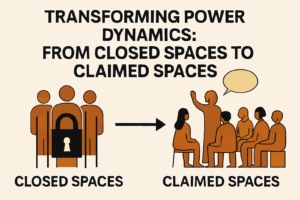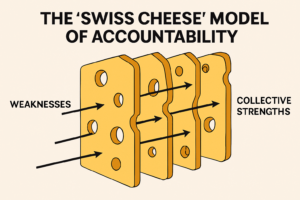Empowering Change in 2025: From Compliance to Power Shift in Accountability and Safeguarding
The start of 2025 marks a turning point for the aid sector as we start to see the immediate impact of the USAID funding cut. Years of pledges to improve accountability and safeguard vulnerable populations have yielded only incremental progress, while power imbalances and systemic inequities continue to expose those most in need to harm. The recent USAID funding freeze has highlighted the vulnerability of an aid system overly reliant on centralized donors and compliance-driven models. In response to the current crisis, “Humanitarian Reset” issued by UN Emergency Relief Coordinator calls for a fundamental shift—moving beyond compliance to empower affected communities with real leadership and agency. Now is the time for meaningful, transformative action.
Drawing on my PhD research into NGO accountability and safeguarding, this article explores key emerging trends for 2025 and outlines practical steps NGOs can take to move beyond rhetoric and toward meaningful change.
Why Accountability Needs a Reset in 2025
Since the safeguarding scandals of 2018, the humanitarian sector has sought to improve accountability, with accountability standards like the Core Humanitarian Standard on Quality and Accountability (CHS) guiding a leading effort. Yet, power asymmetries, ineffective mechanisms, and cultural stigmas continue to obstruct real progress.
Safeguarding failures are not isolated incidents; they are symptoms of an aid system where those receiving assistance have little control over the structures meant to protect them. To address this, the sector must move beyond compliance-driven models and embrace a community-led, justice-oriented accountability approach—one that gives crisis-affected populations direct agency in decisions that impact their safety and well-being.
Transforming Power Dynamics: From Closed Spaces to Claimed Spaces
 A key lesson from my research is the urgent need to dismantle entrenched power imbalances. Too often, aid workers and institutions hold disproportionate control over resources and decision-making, creating an environment where abuses of power—whether coercion, exploitation, or exclusion—go unchecked.
A key lesson from my research is the urgent need to dismantle entrenched power imbalances. Too often, aid workers and institutions hold disproportionate control over resources and decision-making, creating an environment where abuses of power—whether coercion, exploitation, or exclusion—go unchecked.
Many humanitarian organizations operate within “closed” power spaces, where policies and programs are designed without meaningful engagement from affected populations. To ensure genuine accountability, NGOs must shift toward “claimed” spaces, where communities actively shape policies, governance structures, and response efforts.
In regions such as East Africa, community-led response initiatives have demonstrated that shifting power to local actors leads to more sustainable and effective safeguarding mechanisms. In 2025, the aid sector must not only champion such approaches but institutionalize them across operations.
The ‘Swiss Cheese’ Model: Closing Gaps in Safeguarding
Traditional accountability mechanisms—hotlines, complaint boxes, and whistleblower policies—often fail to reach those most at risk. Language barriers, digital divides, and fear of retaliation can all prevent survivors from reporting abuses.
My research stresses the ‘Swiss Cheese’ model of accountability, which recognizes that individual mechanisms each have inherent weaknesses. However, when layered together, their collective strengths compensate for individual gaps.

For example:
- Hotlines may exclude those without phone access.
- Complaint boxes can be inaccessible to individuals with disabilities.
- Community leaders and mobile protection desks provide alternative pathways for reporting.
To build robust and resilient safeguarding systems, NGOs must address key gaps, including:
- Lack of awareness about reporting mechanisms.
- Exclusion of vulnerable groups, including children and individuals with disabilities.
- Insufficient safe spaces for survivors to report abuse.
- Failure to centre victims and complainants in accountability processes.
- Lack of enforcement mechanisms and consequences for perpetrators.
By implementing layered and survivor-centred approaches, NGOs can ensure that every voice is heard and every case is taken seriously.
The USAID Funding Freeze: A Wake-Up Call for Systemic Reform
The recent USAID funding freeze has disrupted humanitarian operations worldwide, exposing the sector’s over-reliance on large institutional donors. While devastating in the short term, this crisis presents an opportunity to reimagine humanitarian aid—one that prioritizes locally led solutions and shifts power away from traditional gatekeepers.
Without financial dependence on a handful of funders, NGOs have the chance to:
- Diversify funding models, reducing reliance on restrictive donor policies that often prioritize compliance over impact.
- Empower local organizations, ensuring communities play a direct role in aid distribution and oversight.
- Strengthen grassroots accountability structures, embedding safeguarding mechanisms that are contextually relevant and survivor-led.
The aid sector can no longer afford to operate as a top-down, externally driven system. The future of safeguarding and accountability lies in locally owned, community-driven models that prioritize resilience over donor compliance.
Final Thoughts: The Time for Bold Action
The USAID funding freeze has made one thing clear: the aid sector cannot afford to rely on outdated power structures that exclude affected communities from decision-making. NGOs must seize this moment to shift from compliance-driven accountability to meaningful, survivor-centred systems. This means ensuring that local actors are not just implementers of donor policies but leaders in designing, monitoring, and enforcing accountability frameworks.
The time for incremental change is over. If safeguarding and accountability are to be more than empty commitments, they must become non-negotiable priorities embedded in every aspect of humanitarian work. The sector’s credibility—and the safety of those it serves—depends on it.

